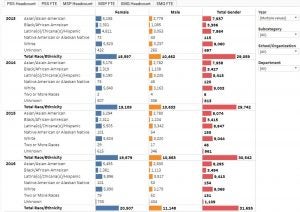What criteria does EDI use to evaluate funding requests?
More detailed information about our evaluation criteria can be found in the EDI Funding Requests Policy Memorandum and the EDI Funding Requests Evaluation Rubric. As reflected in both documents, the most important factor is whether the event, program, or project will promote our Office’s mission by advancing equity, diversity, and inclusion at UCLA.
Given the First Amendment, can EDI decide whether to fund a project on the basis of its content?
Absolutely. Let’s say you’re planning an event regarding a newly discovered species of crustacean. That sounds super exciting—an event we might want to attend. But will EDI fund it? Probably not. Why? Because as valuable as this event may be to the life of the university, it doesn’t meaningfully further our Office’s specific mission to promote equity, diversity, and inclusion at UCLA. Hopefully someone else on campus can provide financial support; it just won’t be us.
OK, you won’t fund talks about crustaceans. But what about events or projects that condemn “equity,” challenge “diversity,” or mock “inclusion”? Don’t you have to be neutral between pro- and anti-diversity viewpoints? If a group wants to bring in the Minister of Inequity, Homogeneity, and Exclusion onto campus, don’t you have to fund it?
Nope. To see why, we have to always distinguish between UCLA as “sovereign” versus UCLA as “speaker.” As a general matter, when UCLA acts as “sovereign,” it may not limit speech simply because it disagrees with the message. This is precisely why UCLA regularly tolerates speakers who are antithetical to Bruin Values. But sometimes UCLA isn’t acting as a sovereign; instead, it’s just using its own voice as a “speaker.” As a speaker, UCLA can pick sides, for example, in favor of diversity over homogeneity, dialogue over demagoguery, equity over inequity, love over hate. Often, such speech occurs through messages from senior leaders to the campus community. But EDI can also speak through our funding decisions. And when EDI speaks, it is always with the goal of building, not undermining, equity for all.






